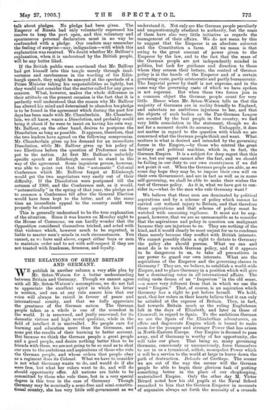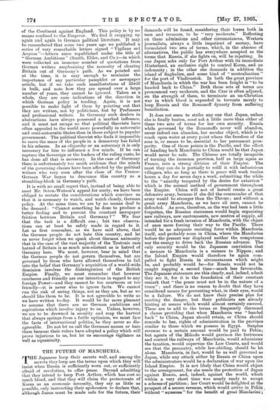W E publish in another column a very able plea by
Mr. Seton-Watson for a better understanding between Britain and Germany. Though we cannot agree with all Mr. Seton-Watson's assumptions, we do not fail to appreciate the excellent spirit in which his letter is written, and can at any rate assure him that our voice will always be raised in favour of peace and international comity, and that we fully appreciate the greatness of the German nation. The German people taken as a whole is one of the soundest in the world. It is renowned, and jtstly renowned, for its domestic virtues and high moral qualities, while in the field of intellect it is unrivalled. No people care for learning and education more than the Germans, and none put the results of their learning to better account. But because we think the German people a great people and a good people, and desire nothing better than to be friends with them, we are not going to be so mad as to shut Mir eyes to the ambitions and aspirations of those who rule the German people, and whose orders that people obey as a regiment does its Colonel. What we have to consider is not what Germany wants to do, and would do if she were free, but what her rulers want to do, and will do should opportunity offer. All nations are liable to be committed by those who rule them, but in a very special degree is this true in the case of Germany Though Germany may be nominally a semi-free and semi-constitu- tional country, she has very little self-government as we understand it. Not only are the German people peculiarly and unquestioningly obedient to authority, but the mass of them have also very little initiative as regards the management of their affairs. We do not mean by this to suggest that the Emperor is an absolute autocrat and the Constitution a farce. All we mean is that owing to the great amount of power given to the Emperor by the law, and to the fact that the mass of the German people are not independently minded in politics, but look for guidance and direction to those whom they esteem their betters, the control of German policy is in the hands of the Emperor and of a certain governing caste, partly aristocratic and partly bureaucratic. The Imperial power by itself is not supreme, and in the same way the governing caste of which we have spoken is not supreme. But when these two forces join in a common object the German people count for very little. Hence when Mr. Seton-Watson tells us that the majority of Germans are in reality friendly to England, and entertain no ambitions injurious to her, and that the objects of such bodies as the Pan-German League are scouted by the best people in the country, we find very little consolation in the statement, though we do not for a moment doubt its accuracy. Unhappily, it does not matter in regard to the question with which we are concerned what the German people think and want. What matters is what is desired and intended by the governing forces in the Empire,—by those who control the great military and political machine, which is, in fact, the German Empire. It is a subject for deep regret that this is so, but our regret cannot alter the fact, and we should be failing in our duty to our own countrymen if we did not point it out. When the German people are able, as we some day hope they may be, to impose their own will on their own Government, and are in fact as well as in name self-governing, we shall be able to make their wishes the test of German policy. As it is, what we have got to con- sider is,—what do the men who rule Germany want ?
We believe that these men are dominated by political aspirations and by a scheme of policy which cannot be carried out without injury to Britain, and that therefore those aspirations and that scheme of policy must be watched with unceasing vigilance. It must not be sup- posed, however, that we are so unreasonable as to consider that the aspirations and policy in question are malignant because they are injurious to us. They are nothing of the kind, and it would clearly be most unjust for us to condemn them merely because they conflict with British interests. We cannot possibly claim a right to dictate to Germany I the policy ,she should pursue. What we can and I must do is to watch German policy, and if it appears to be dangerous to us, to take all precautions in our power to guard our own interests. What are the aspirations of the Emperor and the governing classes in Germany ? They are, we believe, to establish a world-wide Empire, and to place Germany in a position which will give her a dominating voice in all international affairs. The ruling caste dream of an " Imperium " in the old sense, —a sense very different from that in which we use the word "Empire." That, of course, is an aspiration which Germany has a right to put before herself. We hold, next, that her rulers in their hearts believe that it can only be satisfied at the expense of Britain. They, in fact, feel towards Britain much as the ruling Englishmen felt in the days of Elizabeth, and later in those of Cromwell, in regard to Spain. To the ambitious German we are the ' Spain of the Elizabethan adventurers, an effete and degenerate Empire which is bound to make room for the younger and stronger Power that has arisen in North-Eastern Europe. Our Empire is doomed to pass away, and if Germany is worthy of her opportunity, she will take our place. That being so, many governing Germans, consciously or unconsciously, force themselves to see in us a tyrannical, selfish, monopolist Power which it will be a service to the world at large to hurry down the path of destruction. Delenda eat Carthago. The sooner we are out of the way the sooner will the German people be able to begin their glorious task of putting something better in the place of our shopkeeping, materialised Empire. Only the other day M. Victor B6rard noted how his old pupils at the Naval School remarked to him that the German Emperor in moments of expansion always set forth the necessity of a crusade of the Continent against England. This policy is by no means confined to the Emperor. We find it cropping up again and again in German political literature. It may be remembered that some two years ago we published a series of very remarkable letters signed " Vigilans sed Aequus "—letters since republished under the title of "German Ambitions" (Smith, Elder, and Co.)—in which were collected an immense number of quotations from German writers emphasising the necessity of clearing Britain out of Germany's path. As we pointed out at the time, it is easy enough to minimise the importance of any particular pamphlet or newspaper article, but if we take such manifestations of illwill in bulk, and note how they are spread over a large number of years, they cannot be ignored. Taken as a whole, they are sure indications of the direction in which German policy is tending. Again, it is not possible to make light of them by pointing out that they are written, not by politicians, but by Professors and professional writers. In Germany such dealers in abstractions have always possessed a marked influence, and it must not escape us that political theorists have often appealed to the world more powerfully in autocratic and semi-autocratic States than in those subject to popular government. The political theorist who finds it impossible to move the mass of the people in a democracy has failed in his scheme. In an oligarchy or an autocracy it is only necessary for him to influence a few minds. If he can capture the Sovereign or the leaders of the ruling caste, he has done all that is necessary. In the case of Germany there is unfortunately too much evidence that the minds of the governing classes have been affected by the political writers who very soon after the close of the Franco- German War began to denounce this country as a stumbling-block in Germany's path.
It is with no small regret that, instead of being able to meet Mr. Seton-Watson's appeal for amity, we have been obliged to restate the considerations which convince us that it is necessary to watch, and watch closely, German policy. At the same time, we are by no means deaf to the demand : "Cannot something be done to produce a better feeling and to prevent the constant newspaper friction between Britain and Germany ? " We fear that the task is a difficult one ; but two observa- tions can at least be safely made in regard to it. Let us first remember, as we have said above, that the German people do not hate this country, and let us never forget when we speak about German animosity that in the case of the vast majority of the Teutonic race hatred of Britain is as much non-existent as is hatred of Germany here. We must, however, bear in mind that the German people do not govern themselves, but are governed by those who have allowed themselves to fall into the belief that Germany's acquisition of a world-wide dominion involves the disintegration of the British Empire. Finally, we must remember that however courteous and friendly are our intentions in regard to any foreign Power—and they cannot be too courteous or too friendly—it is never wise to ignore facts. We cannot run the risk of seeing things, not as they are, but as we should like them to be. It is not agreeable to write as we have written to-day. It would be far more pleasant to assume that there are no German ambitions and aspirations which involve injury to us. Unless, however, we are to be drowned in security and reap the harvest that always springs from a futile optimism, we must face the facts of international politics, be they never so dis- agreeable. Do not let us call the Germans names or hate them because their rulers have adopted a policy which will prove injurious to us, but let us encourage vigilance as well as equanimity.







































 Previous page
Previous page